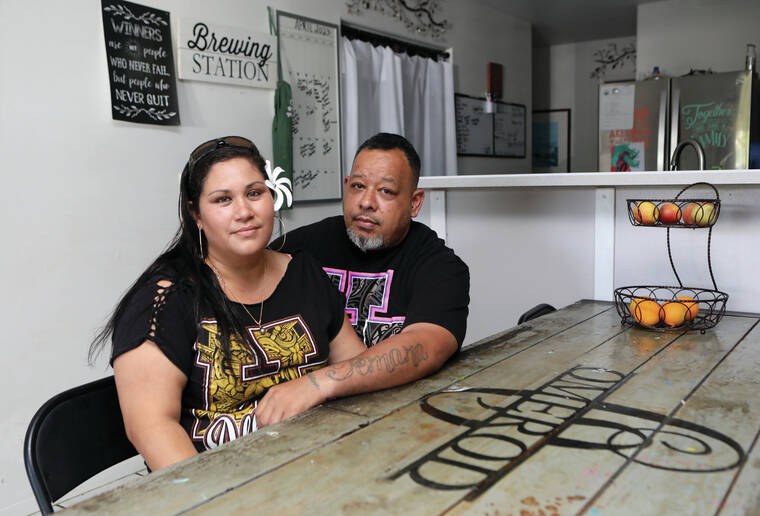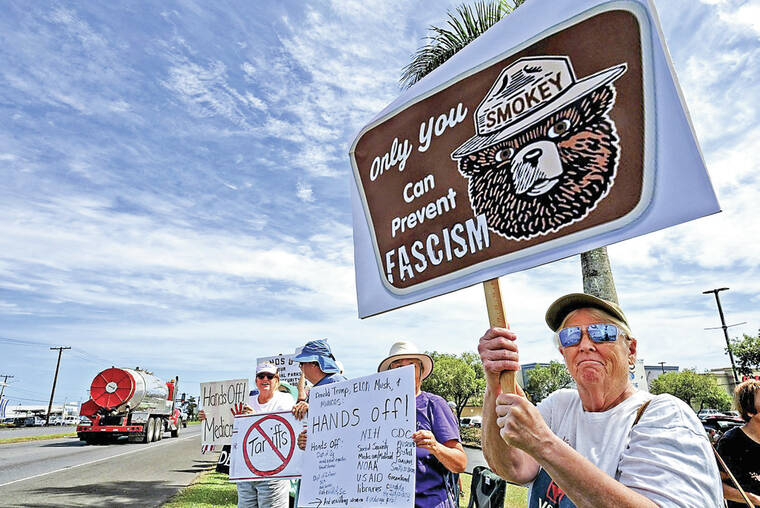Over the past three years, foster parents Michelle and Aaron Omerod have welcomed 21 youths into their Hawaiian Paradise Park home.
The nonprofit Partners in Development Foundation and its Project Pilina foster care services program — the agency that trained and licensed the Omerods as foster parents — praise the couple’s success in helping at-risk youths. Especially impressive is their willingness to foster teenagers, a task many would rather not take on.
“With the teenagers, the hardest thing is when you get them, that they’ve been raised a certain way for a number of years,” said Aaron Omerod, a 42-year-old adult corrections officer. “That is already embedded in them, what they learned. And you only get so much time to show them that there’s a different way, a way where they can achieve.”
“A lot of them, the older siblings, they don’t even know what it is to be a kid, because they had to be the mom or the dad,” added Michelle Omerod, a 36-year-old stay-at-home mom. “And when they get taken out of the situation, they’re in, they get to be a kid.
“You know, half those kids, when they came here, they didn’t even crack a smile. They wouldn’t even leave their room. They were depressed. Now, they’re outside. They’re playing. They get to be kids.”
The Omerods currently have six foster children ages 9 through 16 under their roof. That’s in addition to their own three biological children.
According to Michelle, it took time to get through to the teens.
“You have to learn to be a therapist,” she said. “It’s kind of tough, because some of these kids have really been through hell and back. Even an adult like me, I cry to think of what they’ve gone through.”
May is National Foster Care Awareness Month. In Hawaii, there are approximately 1,200 youths in foster care, and roughly 300 of them are teenagers. But for Michelle, foster care awareness has been a daily mindset for more than two decades.
“This has been my dream since I was, like, 12,” she said. “A lot of my friends were in foster homes, and it wasn’t the greatest. There’s a lot of experiences that they’ve gone through that I wish they never did. And that’s why I wanted to become a foster parent.”
For her husband, taking the plunge into foster parenthood took a bit more convincing.
“I told my wife before that this is something I never thought I would be doing at any point in my life,” Aaron said. “After a few years, I did figure out that this is something that she was passionate about doing. So, of course, I want to stand by what she wants to do and support her.
“After three years, you get used to having all the kids in the house.”
Sometimes, there are even more youths in the Omerod home, because the youngsters have friends who sometimes need what Michelle called “a safe place, even if only for a night.”
“We’ve had a lot of our kids’ friends come over because they know that they’re safe here,” she said.
The Omerods take their extended ‘ohana to school every school day — four schools, in all. And while seeing to it the youngsters make it to school and take an interest in their schoolwork is a start, Michelle said there’a more that needs to be done for local youths.
“For example, Puna doesn’t have a basketball team where youth can go, even if it’s at Shipman Park,” she said. “A lot of these kids want to play basketball, but they have to wait for middle school or high school. However, you have to have certain grades to remain eligible. These kids need that out, where they’re not going to be judged.
“If you offer things like that to kids who are interested, they’ll stay away from smoking weed at the park. They’ll stay away from doing all this other stuff and having babies because they’re bored.”
Fostering does come with a stipend per child, but both Omerods said that’s not why they do it, nor is the money enough.
“The stipend hasn’t gone up in a number of years, so it doesn’t keep up with the cost of living,” Michelle said.
According to Michelle, there’s also a need for more social workers and smaller case loads for social workers.
“They’re doing the best they can, but they’re short-staffed, and there are so many children. The interim home is over capacity,” she said, referring to a group home for unplaced youths run by the state Department of Human Services.
Michelle added there’s also a critical need for therapeutic homes — homes in which foster parents have a higher level of training and take in only one child who has needs above and beyond those of most foster children.
“There are a lot of kids who need that extra attention,” she said. “They need that extra help. Bur there’s not enough help.”
According to Michelle, it’s rewarding to see teenagers feeling more hopeful after accomplishments such as passing tests and getting their driving permits. She pointed to two success stories who were in the Omerods’ care.
“One was held back a grade and didn’t know what he was going to do. And now, he’s going to college,” she said. “And another is in the Air Force.”
And while there are real success stories, more than half of the incarcerated youth and adult population in Hawaii have a Native Hawaiian or Pacific Islander background — and many have been involved in systems of foster care, child welfare, mental health services, special education or family court.
“Nobody wants to take on teens because of their baggage” Michelle said. “But this is their last chance before they become an adult.
“This is our chance to make a difference before we see them on the other side of the bars.”
During the month of May, Project Pilina has events free to the public to support children in foster care. Join a statewide virtual information session at 6 p.m. today or at noon on June 7 via Zoom.
And on Saturday, a job readiness fair at Connect Point Church in Hilo will encourage youth in foster care to learn about workforce preparedness and basic financial education. Attendees will receive $200 gift cards for Old Navy, Macy’s or Jean’s Warehouse to purchase job-ready attire.
To learn more about supporting Hawaii’s children in foster care, visit pidf.org/projectpilina.
Email John Burnett at jburnett@hawaiitribune-herald.com.






